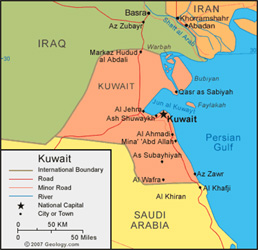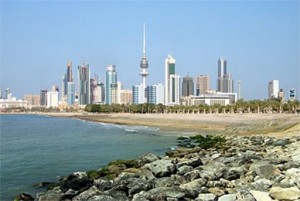Can we finally stop pretending that the “Arab Spring” was some sort of noble struggle for democracy? After more than 35,000 deaths, increasing threats to Israel’s safety, heightened persecution of Christians and a decided trend toward further Islamification, only irrational Leftists still delude themselves into thinking this is “democracy.” No. This is what we call theocracy. Aka – totalitarian rule based on Islamic fundamentalism.
 And now, as Doug Bandow at the American Spectator reports, Kuwait appears to be headed in the same direction as their neighbors. Yes, that would be the same Kuwait whose butt we saved from the Iraqi invasion in the first Gulf War.
And now, as Doug Bandow at the American Spectator reports, Kuwait appears to be headed in the same direction as their neighbors. Yes, that would be the same Kuwait whose butt we saved from the Iraqi invasion in the first Gulf War.
In “A Religious Fire Bell in the Night,” Brandow discusses the latest developments in that country ~
Many of America’s biggest security threats emanate from its nominal allies, such as Pakistan and Saudi Arabia. Without them neither the Taliban nor al Qaeda would have been nearly so strong.
These countries also are hostile to religious minorities. Other malefactors include Iraq, where the government is a creation of U.S. invasion, and Afghanistan, where the government survives only with allied military support.
Religious intolerance is on the rise even in Kuwait, perhaps America’s best friend in the Arab world.
Until now Christians have worshipped freely in the Persian Gulf state. However, growing threats to religious minorities reflect public attitudes which could undermine the heretofore close U.S.-Kuwait relationship.
In December 2011 Kuwait’s Prime Minister and cabinet resigned over an alleged corruption row. Unfortunately for Western interests, the replacement elections installed a new Islamist majority in parliament.
Brandow continues;
It’s not the same as an Islamist takeover in, say, Pakistan, or even what might happen in Egypt. Kuwait is a small society in which most everyone seems to know or is otherwise connected with everyone. Many Islamists, including some who I met, were seen more as moderate government critics than intolerant crusaders.
Yet it didn’t take long for the new majority to press for policies contrary to Kuwait’s record of openness. The Islamist group — formal parties do not exist — proposed amending the constitution to make Sharia the source of law. The Emir said no, but he did accept legislation to impose the death penalty on Muslims for blasphemy (non-Muslims remained subject to a fine and imprisonment).
Worse, just a couple weeks after the election MP Osama Al-Monawer proposed drafting a law to turn Al-Asheikh’s pronouncement into law. Explained Al-Monawer: “Kuwait is an Islamic country where churches are not permitted to be built.” An Islamist cleric in Kuwait, Sheikh Saleh Al-Ghanem, backed the parliamentarian, arguing that according to Mohammed no non-Islamic “religion may be practiced in the Arabian Peninsula.” And Al-Asheikh endorsed the proposal, explaining that “Kuwait is part of the Arabian Peninsula, and [countries in] the Arabian Peninsula must demolish any churches” because “the Prophet instructed us that there is no place for two religions” in the Peninsula. If such a measure was enacted, Kuwait would suddenly look a lot like Saudi Arabia.
But not to worry…
Kuwaiti religion minister Al-Shabab explained that “the constitution of Kuwait guarantees its citizens [freedom of] religion and worship, and Islam is well known as a tolerant religion.
Demolishing churches and forbidding the members of the Christian community from worshipping contravenes the state laws and regulation.”
Bandow concludes by saying that the situation isn’t hopeless. At this point, he believes, the extremists have been largely subdued.
For now, at least, the threat of actual religious persecution in Kuwait has passed. The government deserves credit: the ruling family remains committed to a forward-looking and open country. Long noted for its generally free press and fair elections, Kuwait remains a tolerant society as well.
Kuwait City
Nevertheless, unsettling popular currents are running strongly through a population that remains very friendly to America. The fact that the most powerful parliamentary faction contemplated passing legislation to shut every Christian church — and had the votes to do so — offers a warning if Kuwait eventually becomes a full parliamentary democracy, as some Kuwaitis desire. If final political decisions in Kuwait were made by an elective prime minister rather than a hereditary emir, every Christian church in the country might have been demolished by now.
Robert Spencer at Jihad Watch is much less optimistic, considering recent news from Kuwait:
Kuwaiti gets 10 years in prison for insulting Muhammad on Twitter; and,
Islamic supremacist MP’s still plan to make Sharia the only source of law, over objections of the country’s ruler.
Time will tell, but it’s not looking good for democracy in Kuwait any more than in the rest of the Muslim-majority Middle East. Stay tuned for further developments.
~~~~~~~~~~~~~~~
Related:
Open Doors ~ Kuwait is presently #30 on the World Watch List of countries that restrict religious freedom.





